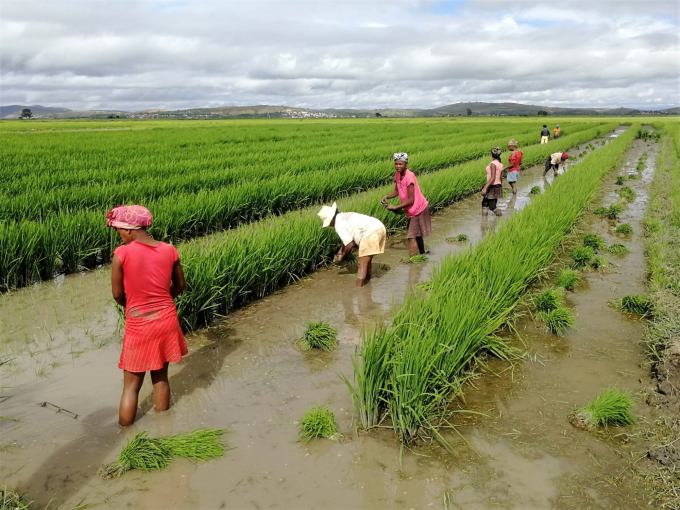November 28, 2025 | 02:11 GMT +7
November 28, 2025 | 02:11 GMT +7
Hotline: 0913.378.918
November 28, 2025 | 02:11 GMT +7
Hotline: 0913.378.918

The FAO-China SSC Programme has reached more than 100,000 direct beneficiaries and several hundred thousand indirect beneficiaries
©FAO/Fanilo Randriatsizafy
The Food and Agriculture Organization of the United Nations (FAO) has signed an agreement with the Chinese Government officially launching Phase III of the FAO-China South-South Cooperation (SSC) Programme.
The General Agreement was signed by the Director-General of FAO, QU Dongyu and the Minister of Agriculture and Rural Affairs of the People’s Republic of China,TANG Renjian.
It followed the announcement by Chinese President Xi Jinping in September 2020 of an additional $50 million in funding for the Programme.
President Xi made the pledge during a video address to the general debate of the United Nations General Assembly.
The agreement underlines “China’s effort to prioritize the development of agriculture and rural areas through the ongoing rural revitalization strategy” and FAO’s mandate in food security and nutrition, agriculture, fisheries, and forestry, “including providing technical assistance to its Members in the field of sustainable development and resilient livelihoods.”
“This is an important agreement, both in terms of synergy between China’s experience and FAO’s priorities and also for China’s continuous contribution to promoting South-South and Triangular Cooperation, to transform agrifood systems and to achieve Better Production, Better Nutrition, a Better Environment and a Better Life for all, leaving no-one behind,” FAO Director-General QU Dongyu said.
The overarching goal of Phase III of the FAO-China SSC Programme is to support developing countries in achieving sustainable agrifood systems transformation and to contribute to the implementation of the 2030 Agenda and Sustainable Development Goals (SDGs), especially SDG1 and SDG2.
Phase III of the FAO-China SSC Programme covers six key thematic areas: agricultural production and productivity; value chains and trade; tropical agriculture and dryland farming; resilience building; emergency response, and global governance and traditional agricultural areas. Special focus will also be given to food loss and waste, innovation and digital agriculture, among others.
Substantial results
In 2009, the FAO-China SSC Programme was established with an initial contribution of $30 million for Phase I, allowing exchanges of knowledge and experience between China and other countries of the global South. In 2015, China contributed an additional USD 50 million for Phase II of the Programme.
The FAO-China SSC Programme has achieved substantial results to date. Under this flagship South-South and Triangular Cooperation Programme, a total of 25 national, regional, inter-regional and global projects have been implemented to support agricultural development and food security in line with countries’ priorities and needs. The Programme has reached more than 100,000 direct beneficiaries and several hundred thousand indirect beneficiaries at grassroots level in rural areas. Chinese experts fielded in host countries have transferred practical and adaptable technologies by providing demand-driven demonstrations and trainings in collaboration with local counterparts.
In addition to the field projects, more than 50 global capacity development events and activities have been organized with the participation of thousands of government officials, technical experts, small-scale farmers and other stakeholders from over 100 FAO’s member states.
FAO's role in South-South and Triangular Cooperation
The successful introduction of new technologies through SSTC in many countries has contributed to increased food security, especially through the improvement of agricultural productivity, diversification of food crops, small animal and fish production, and rural incomes.
Over the past two decades, a total of $435 million has been invested in SSTC projects and activities.
(FAO.org)

(VAN) A new study reveals how the simultaneous effects of ocean acidification, salinity and loss of oxygen are making the world more fragile.

(VAN) Hopes are growing that the creation of the first 3D turkey gut model could be a turning point in the battle against the virulent blackhead disease.

(VAN) Tyson, America’s biggest meat supplier, plans to shutter one of its largest beef processing plants as the industry continues to struggle with low cattle supplies and political pressure from Washington.

(VAN) New FAO study shows how digital solutions are empowering farmers and fishers to prevent losses and build resilient agrifood systems.

(VAN) Brazil's COP30 presidency pushed through a compromise climate deal on Saturday that would boost finance for poor nations coping with global warming but that omitted any mention of the fossil fuels driving it.

(VAN) Poultry farmers in the UK have been warned that they could face one of the worst winters yet for bird flu.

(VAN) Prices of main-crop paddy have risen sharply, with jasmine rice hitting 16,100 baht per tonne — the highest level in years.